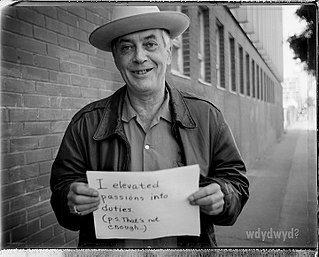A Quote by Marvin J. Ashton
The practice of thrift is not outdated. We must discipline ourselves to live within our incomes even if it means going without or making do. The wise person can distinguish...between basic needs and extravagant wants. Some find budgeting extremely painful, but I promise you, it is never fatal.
Related Quotes
Man can learn self-discipline without becoming ascetic; he can be wise without waiting to be old; he can be influential without waiting for status. Man can sharpen his ability to distinguish between matters of principle and matters of preference, but only if we have a wise interplay between time and truth, between minutes and morality.
There is a wise old saying 'Eat it up, wear it out, make it do, or do without'. Thrift is a practice of not wasting anything. Some people are able to get by because of the absence of expense. They have their shoes resoled, they patch, they mend, they sew, and they save money. They avoid installment buying, and make purchases only after saving enough to pay cash, thus avoiding interest charges. Frugality means to practice careful economy.
True happiness is to enjoy the present, without anxious dependence upon the future, not to amuse ourselves with either hopes or fears but to rest satisfied with what we have, which is sufficient, for he that is so wants nothing. The greatest blessings of mankind are within us and within our reach. A wise man is content with his lot, whatever it may be, without wishing for what he has not.
To be free people we must assume total responsibility for ourselves, but in doing so must possess the capacity to reject responsibility that is not truly ours. To be organized and efficient, to live wisely, we must daily delay gratification and keep an eye on the future; yet to live joyously we must also possess the capacity, when it is not destructive, to live in the present and act spontaneously. In other words, discipline itself must be disciplined. The type of discipline required to discipline discipline is what I call balancing.
Love is the ability to live your life with an empowered heart without attachment to the outcome, the ability within yourself to distinguish within yourself between love and fear and choose love regardless of what is going on inside yourself or outside. This is self-mastery or authentic power...that means you become clear, forgiving, humble and loving... you are grounded in harmony, cooperating, sharing and reverence for life.
Whenever I hear about a child needing something, I ask myself, 'Is it what he needs or what he wants?' It isn't always easy to distinguish between the two. A child has many real needs which can and should be satisfied. His wants are a bottomless pit. He wants, for example, to sleep with his parents. He needs to be in his own bed. At Christmas he wants every toy advertised on television. He needs only one or two.
All of us are responsible to provide for ourselves and our families in both temporal and spiritual ways. To provide providently, we must practice the principles of provident living: joyfully living within our means, being content with what we have, avoiding excessive debt, and diligently saving and preparing for rainy-day emergencies. When we live providently, we can provide for ourselves and our families and also follow the Savior's example to serve and bless others.
In order to settle down in the quiet of our own being we must learn to be detached from the results of our own activity. We must be content to live without watching ourselves live, to work with expecting immediate reward, to love without an instant satisfaction, and to exist without any special recognition. It is only when we are detached from ourselves that we can be at peace with ourselves.
We forgive, if we are wise, not for the other person, but for ourselves. We forgive, not to erase a wrong, but to relieve the residue of the wrong that is alive within us. We forgive because it is less painful than holding on to resentment. We forgive because without it we condemn ourselves to repeating endlessly the very trauma or situation that hurt us so. We forgive because ultimately it is the smartest action to take on our own behalf. We forgive because it restores to us a sense of inner balance.
If we are at war with our parents, our family, our society, or our church, there is probably a war going on inside us also, so the most basic work for peace is to return to ourselves and create harmony among the elements within us - our feelings, our perceptions, and our mental states. That is why the practice of meditation, looking deeply, is so important.
You have to learn humility. First of all you have to be humble people. Unless and until you have a large heart you can never humble down. You have to be an extremely humble person. Humility doesn't mean that you bow to a person who is dominating, it never means that. But it means a strength within you. The person who is weak can never be humble.



































